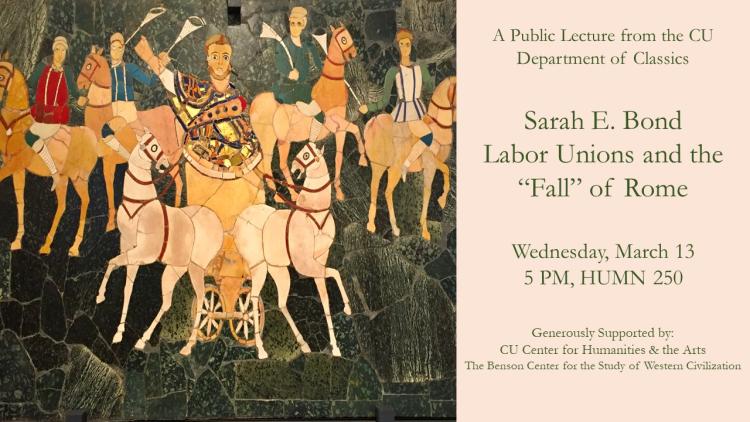Labor Unions and the "Fall" of Rome
Sarah E. Bond
Wednesday, March 13, 2024
5pm - Eaton Humanities (HUMN) 250
 ABSTRACT
ABSTRACT
Arresting a charioteer in the late Roman world was a perilous act. A large portion of the Roman populace felt great affinity for members of one of the four factiones (“factions”) that dominated the chariot racing scenes in dozens of Roman cities with a hippodromes across the Roman Mediterranean. The arrest of a charioteer put the success of these factions at risk. It could also put hundreds of people out of work. Late Roman athletic unions and factions often consisted of up to 200 people, many with overseers, animal trainers, doctors, veterinarians, masseurs, stable hands, and a network of other individuals who worked collectively with the charioteers to put on races in the circus about every 5-6 days in cities like Rome and Constantinople. This talk looks at the internal structure of the late Roman athletic unions, entertainment groups (e.g. actors, musicians, bear trainers), and charioteer factions that underpinned the bustling economy of the Roman hippodrome. Although many people think of labor unions as a modern development, the roots of the medieval guilds and modern labor unions lay in antiquity. And charioteers were often the union figurehead, guiding both their faction and their fans to political ends. Re-viewing Late Antiquity through the lens of labor organization, strikes, work contracts, and—when deemed necessary—coordinated violence, leads us to a different narrative of the “fall” of Rome, this time from below.
Sarah E. Bond is an associate professor and director of undergraduate studies in the History Department at the University of Iowa. She is interested in late Roman history, epigraphy, late antique law, Roman topography and GIS, Digital Humanities, and the socio-legal experience of ancient marginal peoples.
She earned a PhD in History from the University of North Carolina at Chapel Hill (2011) and obtained a BA in Classics and History with a minor in Classical Archaeology from the University of Virginia (2005). Her book, Trade and Taboo: Disreputable Professionals in the Roman Mediterranean, was published with the University of Michigan Press in 2016.
Generously Supported by: CU Center for Humanities & the Arts and The Benson Center for the Study of Western Civilization
